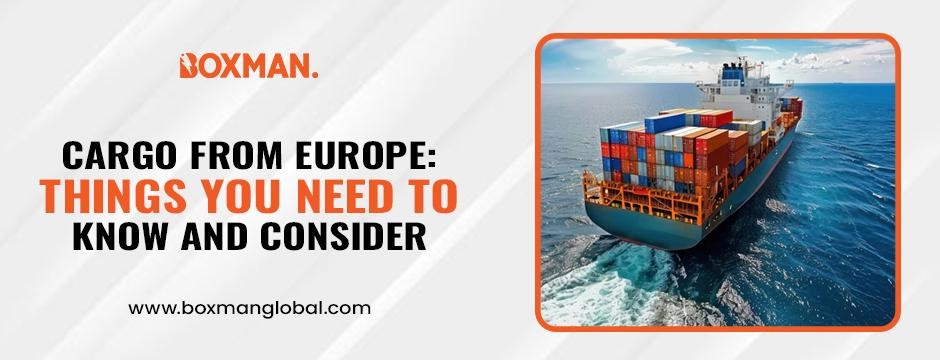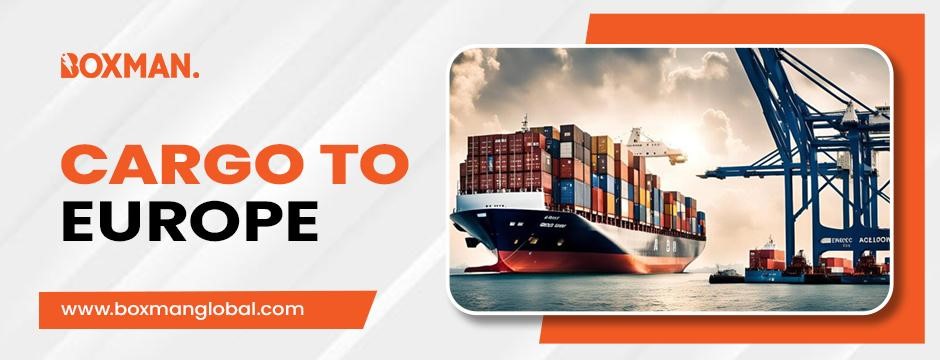
When importing cargo from Europe, understanding key factors and transportation modes is crucial for a seamless shipping experience. Europe is a major hub in global trade, with extensive networks and options for various shipping needs. Whether you're a small business or an established importer, navigating these complexities efficiently can help you avoid delays, reduce costs, and stay competitive. This blog explores the essentials of shipping from Europe, including transport options, trade lane management, customs, and selecting the right shipping partner.
Modes of Shipping from Europe
Shipping cargo from Europe involves several transport options to cater to diverse needs. Each mode comes with its advantages and considerations:
Sea Freight: Efficient and Economical
Sea freight is a favored mode for transporting large or bulk shipments. In 2022, maritime transport accounted for 67.8% of total freight transport in the EU. This method offers cost-effectiveness and the capacity to carry heavy or oversized items. Major European ports like Rotterdam, Hamburg, and Antwerp serve as critical hubs, connecting Europe to global destinations. Although sea freight may have longer transit times, it is ideal for businesses balancing cost and delivery time.
Air Freight: Speed and Reliability
For shipments that need quick delivery, air freight is the ideal choice. Europe’s comprehensive network of international airports offers a fast and reliable solution for delivering goods worldwide. Air freight is ideal for perishable or urgent items that need swift transportation. Though it typically comes with a higher cost than sea freight, the speed and security it provides can justify the expense for certain shipments.
Road Freight: Efficient Intracontinental Transport
Road freight is a key mode for regional distribution within Europe, accounting for 24.9% of the continent’s freight transport in 2022. It facilitates efficient transportation across different European countries, thanks to a well-developed road infrastructure. This method offers flexibility for door-to-door delivery and quick regional distribution, making it ideal for smaller shipments or quick cross-border deliveries.
Rail Freight: Sustainable and Cost-Effective
Rail freight is gaining traction as a sustainable alternative, particularly for long-distance shipments within Europe. Rail transport accounted for 5.5% of freight movement in 2022. It’s an eco-friendly option that efficiently connects major cities and industrial hubs. Rail freight can be combined with other modes like road or sea to create intermodal solutions, optimizing efficiency and reducing environmental impact.
Key Considerations in Shipping from Europe
Trade Lane Management
Effective trade lane management is essential for smooth shipping operations. Several factors influence this, including the development of trade routes, global trends, and the political climate. For instance, geopolitical tensions, route developments, or shifts in global supply chains can impact shipping routes and schedules. Being aware of these factors and staying up-to-date can help you optimize shipment planning.
Customs Compliance
Compliance with customs regulations is crucial when importing goods. For example, if the value of goods exceeds EUR 20,000, you must submit a Customs Value Declaration on form DV 1 along with the Single Administrative Document (SAD). This requirement helps assess the value of the transaction and calculate applicable tariffs. Proper documentation, such as commercial invoices and certificates of origin, is essential for smooth customs clearance.
Packaging and Labeling
Proper packaging and labeling are vital for the safety of your goods and compliance with international standards. Ensure your goods are securely packaged to withstand transport conditions, and label them correctly with descriptions, handling instructions, and origin details. Adhering to these standards can help prevent delays during customs inspections and improve delivery efficiency.
Choosing the Right Shipping Partner
Selecting a reliable shipping partner is fundamental to the success of your imports from Europe. Consider these factors when choosing a shipping partner:
Experience and Expertise
Look for a shipping company or freight forwarder with extensive experience in handling shipments from Europe. An experienced partner will have a better understanding of the shipping processes, regulations, and challenges that may arise, ensuring a smoother and more efficient experience.
Network and Coverage
Choose a shipping partner with a broad network that can connect Europe to your desired destinations efficiently. A robust network with extensive services will provide you with flexibility in handling shipments, whether through sea, air, road, or rail.
Track Record and Reputation
It’s essential to evaluate the track record of potential shipping partners. Check customer reviews, industry certifications, and testimonials to gauge their reliability and professionalism. A partner with a solid reputation will likely provide better customer service and smoother handling of your shipments.
Cost and Value
While cost is a significant consideration, assess the value proposition offered by each shipping partner. Look for competitive rates, transparent pricing, and the level of support they provide. A shipping partner who offers value-added services and excellent customer support can enhance your overall shipping experience.
Streamline Your Cargo to Europe with Boxman’s Expert Solutions

Navigating the complexities of international shipping can be daunting, but Boxman’s expert services make transporting your cargo to Europe smooth and hassle-free. Our specialized logistics solutions prioritize efficiency, reliability, and cost-effectiveness to ensure your shipments reach their destination on time and in perfect condition. Experience shipping excellence with Boxman today!
Importing cargo from Europe involves understanding the various transport modes, trade lane management, customs regulations, and the right shipping partner. By carefully planning and choosing a reliable logistics company, you can streamline your shipping operations, reduce costs, and avoid delays.